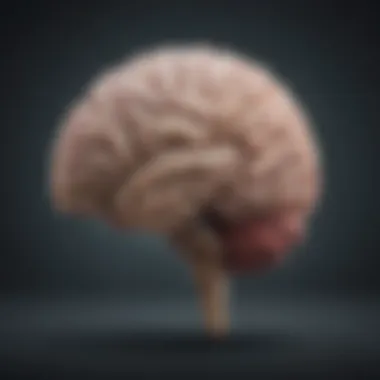Understanding Slow Memory Loss: Causes and Interventions


Intro
Memory loss, especially when it occurs gradually, can be undetected until it significantly affects one’s life. Understanding slow memory loss is critical in identifying its causes and implementing effective strategies to manage it. This article aims to shed light on the complexities surrounding slow memory loss, breaking down biological, psychological, and social dimensions.
The phenomena of memory decline do not discriminate by age, impacting both young and old alike. From subtle forgetfulness in daily tasks to more severe cognitive impairments, the spectrum of slow memory loss varies widely, necessitating a deeper exploration into its nature and implications. Early detection plays a vital role in intervention success, making it imperative for readers to be aware of the signs and available resources. The ensuing sections will expand on recent advancements in understanding memory loss, methodologies employed in research, and practical strategies for management.
Recent Advances
The recent years have seen notable breakthroughs in the study of slow memory loss. The increasing body of research has led to a better understanding of how different factors influence memory decline.
Latest Discoveries
Scientists have identified numerous biological markers that may predict the onset of memory loss. For instance, studies highlight the role of amyloid plaques and tau proteins in Alzheimer’s disease, both of which correlate with cognitive decline. Understanding these underlying mechanisms allows researchers to develop targeted interventions.
Additionally, psychological factors such as stress, anxiety, and depression have been shown to exacerbate memory issues. Recent studies suggest that managing mental health can lead to improved cognitive function.
Technological Innovations
Advancements in technology are also offering new perspectives on memory assessments. Tools like neuroimaging techniques show promise in visualizing brain changes related to memory loss. Machine learning algorithms are now being leveraged to predict cognitive decline more accurately based on collected data. This convergence of technology and neuroscience enriches our ability to preemptively identify and manage slow memory loss.
Methodology
To outline the complexities of slow memory loss comprehensively, it is essential to scrutinize the methodologies applied in recent research.
Research Design
Most studies employ longitudinal designs, which allow for observing individuals over extended periods. This is crucial for understanding the gradual progression of memory decline. Cross-sectional studies can also provide snapshots of cognitive function at different life stages but may lack the depth provided by longitudinal data.
Data Collection Techniques
Various techniques are used in gathering data regarding slow memory loss. Surveys and cognitive tests are common methods, often supplemented by neuroimaging and biological markers. For instance, participants might undergo standardized memory assessments while also providing genetic samples, which can clarifiy predispositions to memory loss.
"Understanding the methodology behind memory loss research is key to grasping its impacts on individuals and society at large."
In summary, exploring slow memory loss requires both a breadth and depth of analysis. This article aims to equip readers with the necessary knowledge to understand this significant issue. As memory impacts various aspects of life, awareness can lead to better coping mechanisms and ultimately, improved outcomes.
Preface to Slow Memory Loss
Slow memory loss has emerged as a critical topic in both the fields of psychology and neuroscience. As societies age, understanding the mechanisms behind gradual cognitive decline becomes increasingly essential. This article seeks to unravel the complexities surrounding slow memory loss, addressing its definition, historical context, and implications for a variety of demographics. By exploring foundational concepts, we can better appreciate how memory loss not only affects individuals but also influences families and communities.
Defining Slow Memory Loss
Slow memory loss refers to the gradual decline in cognitive functions related to storage and retrieval of information. Unlike acute memory loss, which may result from immediate factors like brain injury or severe illness, slow memory loss occurs over time and can be influenced by various biological, psychological, and social factors.
The symptoms of slow memory loss often manifest subtly, making it difficult to detect in the initial stages. Individuals may experience frequent forgetfulness, trouble recalling names or recent events, and difficulty concentrating on tasks that were once straightforward. Understanding these nuances is vital for early recognition and intervention. A deeper comprehension of this phenomenon enables educators and health professionals to devise effective strategies to assist those affected, thus mitigating the potential long-term consequences.
Historical Perspectives
Throughout history, the understanding of memory loss has evolved significantly. Early theories primarily focused on the physical structures of the brain and how they relate to memory functions. The pioneering work of neurologists like Sigmund Freud and later, Norman doidge, contributed to our understanding of memory retention and recall mechanisms through experimental approaches.
In the mid-20th century, research expanded to include psychological frameworks, considering not just the hardware or physical aspect of the brain, but also how social interactions and personal experiences shape memory. Landmark studies, such as those conducted by Elizabeth Loftus on memory distortion, demonstrated that the perception of memory is not merely a replay of past events.
As studies progressed, a holistic perspective emerged, acknowledging that memory is influenced by a complex interplay of biological and environmental factors. This multifaceted approach lays the groundwork for modern explorations of slow memory loss, offering a more comprehensive and nuanced understanding of how it affects individuals across different life stages.
Biological Underpinnings of Memory Loss
Understanding the biological underpinnings of memory loss is critical for grasping how and why cognitive decline occurs over time. This section examines significant biological aspects, including the neurobiology of memory and genetic influences that contribute to memory decline. By exploring these elements, the reader gains insight into how various factors work together in memory function or dysfunction.
Neurobiology of Memory
The neurobiology of memory reflects the complex processes involved in how memories are formed, stored, and recalled. This aspect is essential as it lays the foundation for understanding the mechanisms that may fail in slow memory losses.
Role of the Hippocampus
The hippocampus is a crucial brain structure for memory formation. It plays a key role in consolidating new information into long-term memory. One significant characteristic of the hippocampus is its plasticity, which means it can adapt and change with experience. This plasticity is a favorable aspect because it suggests a potential for recovery or compensatory mechanisms in the event of memory deficits. However, its dense connectivity makes it vulnerable to damage from various factors, including stress and neurodegenerative diseases. Thus, the impairment of the hippocampus can significantly affect overall memory function, highlighting its importance in our understanding of slow memory loss.
Impact of Neurotransmitters
Neurotransmitters are chemicals that facilitate communication between neurons. They are pivotal in ensuring proper cognitive functioning and memory processes. Acetylcholine, for example, is closely linked to attention and memory. Its decline is often observed in conditions like Alzheimer’s disease. The key characteristic of neurotransmitters is their ability to influence the ease with which memories are formed or retrieved. This is why exploring their role is beneficial in discussing memory loss. However, an imbalance in these chemicals can lead to issues like impaired memory recall, which can complicate the management of memory-related conditions.
Genetic Factors
Genetic factors also play a significant role in memory loss. Inherited traits and changes in our genetic code can dictate how susceptible a person is to memory decline. Analyzing these factors provides a clearer understanding of why some individuals may experience slower or more rapid memory loss.
Hereditary Conditions


Hereditary conditions can significantly affect brain health and memory. Certain genetic disorders are known to increase the risk of developing dementia or other memory-related issues. The familial nature of these conditions means that they are passed down through generations, making them a critical topic for discussion. Understanding hereditary conditions allows for early detection and intervention, which is essential for potentially mitigating memory decline. Yet, the disadvantage remains that some of these conditions are unavoidable due to genetic makeup, posing challenges for prevention.
Gene Mutations and Memory
Gene mutations related to memory function can provide insights into how slow memory loss develops. Variants of genes, such as APOE4, are recognized for their association with an increased risk of Alzheimer’s disease. The ability of these mutations to influence cognitive decline is a key aspect worth discussing as it opens avenues for research and possible future interventions. However, these mutations are functional in nature, which means they may lead to complications in the understanding of other contributing factors to memory loss.
The biological foundations of memory loss reveal intricate networks and processes that shape our cognitive realities. Understanding these factors is crucial to provide realistic perspectives on prevention and treatment.
Psychological Factors Influencing Memory Decline
Psychological factors play a crucial role in the understanding of memory decline. They encompass a range of elements that can influence cognitive functions over time. Recognizing these factors is essential for developing effective strategies for managing slow memory loss. The interaction between mental health and cognitive processes can shed light on the pathways through which memory decline manifests.
Cognitive Aging
Normal Aging vs. Pathological Changes
Cognitive aging is a natural process that all individuals experience. It involves gradual changes in mental processes and may lead to slow memory loss. However, distinguishing between normal aging and pathological changes is vital for understanding memory decline. Normal aging is characterized by mild forgetfulness, often referred to as age-related cognitive decline. In contrast, pathological changes can indicate the onset of conditions such as Alzheimer's disease or other forms of dementia.
Key characteristics of normal aging include a stable ability to learn new skills and retain knowledge learned over the years. This aspect can be particularly beneficial in this article as it provides a baseline for what individuals can expect. On the other hand, pathological changes may present sudden shifts in memory capacity and cognitive functions, which warrant further investigation. Understanding this difference can help caregivers and professionals identify when intervention is needed.
Cognitive Resilience
Cognitive resilience refers to an individual's ability to adapt to cognitive challenges and maintain functional abilities despite age-related changes. This aspect is vital as it highlights the potential for positive outcomes even in the context of slow memory loss. One of the significant key characteristics of cognitive resilience is the presence of robust cognitive networks, which help compensate for age-related deficits.
Cognitive resilience is an important consideration in this article, as it emphasizes that not all individuals will experience significant decline. This unique feature allows for a more nuanced understanding of the aging process. By fostering cognitive resilience, people can enhance their capacity to cope with the challenges of memory loss. However, it is essential to acknowledge that factors such as lifestyle, genetics, and early life experiences can influence this resilience.
Mental Health Considerations
Depression and Anxiety
Depression and anxiety are mental health conditions that can significantly impact memory functions. Research indicates that individuals suffering from these conditions often experience memory lapses and difficulties in concentration. Understanding the role of depression and anxiety can provide insights into the broader topic of memory decline.
A key characteristic of depression and anxiety is their ability to create cognitive overload. This aspect makes it difficult for individuals to focus and retain information, leading to the perception of memory issues. This article benefits from addressing these conditions because treating them can lead to improved memory function in affected individuals. However, a unique challenge arises as these mental health issues can often exacerbate the experience of memory loss, creating a cycle that is hard to break.
Stress and Memory Functions
Stress is another psychological factor that can impair memory functions. Chronic stress can lead to elevated cortisol levels, which impacts neuroplasticity and memory formation. Understanding how stress affects memory is essential in the context of slowing memory loss. A key characteristic of stress-related memory decline is its potential to affect both working memory and long-term memory, creating widespread cognitive issues.
In this article, emphasizing the connection between stress and memory functions is beneficial. Individuals experiencing sustained stress are more likely to have difficulty recalling information. The unique feature of this relationship lies in the opportunity for intervention; by managing stress effectively, it may be possible to enhance memory performance. Nonetheless, the challenge remains that individuals under significant stress may find it harder to engage with coping strategies, making awareness and education vital in addressing this concern.
Social and Environmental Influences
Social and environmental influences play a significant role in the development and progression of slow memory loss. Understanding these factors adds depth to our comprehension of memory issues, linking them to broader contexts in which individuals live. Human behavior is shaped not only by genetics and biology but also by the lifestyle choices and social interactions one experiences daily. Thus, examining these influences provides insight into potential preventive measures and coping strategies to mitigate the effects of cognitive decline.
Lifestyle Factors
Physical Activity
Physical activity is a cornerstone of healthy living and serves as a critical element in combating memory decline. The key characteristic of physical activity is its ability to stimulate neurogenesis, the creation of new neurons, particularly in the hippocampus, which is essential for memory formation. Engaging in regular exercise promotes better blood circulation, thereby increasing the delivery of oxygen and nutrients to brain cells.
The unique feature of physical activity is its dual role in enhancing both physical and mental health. On one hand, it improves cardiovascular health, which is essential for maintaining optimal cerebral function. On the other hand, studies have shown that individuals who engage in regular physical activity tend to report improved cognitive functions and memory retention.
However, a disadvantage may arise for individuals who have limited mobility or chronic health issues that restrict their ability to exercise. Thus, tailored exercise programs that cater to differing abilities are vital for maximizing the benefits of physical activity while minimizing potential risks.
Dietary Impacts on Cognition
Dietary impacts on cognition highlight the profound relationship between nutrition and brain health. A balanced diet rich in antioxidants, omega-3 fatty acids, and essential vitamins is crucial in supporting cognitive functions. Foods such as fatty fish, nuts, berries, and leafy greens are known for their positive effects on memory and overall brain health. The Mediterranean diet, in particular, is often lauded for its beneficial effects on reducing cognitive decline, due to its emphasis on healthy fats, whole grains, and a variety of fruits and vegetables.
One key characteristic of dietary impacts on cognition is their long-term effect; consistent nutritional choices can lead to improved cognitive health over time. A unique aspect here is that diets can be customized based on individual preferences and health conditions, allowing people to make dietary choices that align with their cognitive goals.
However, the downside is that nutritional changes require sustained effort and commitment. Furthermore, knowledge about healthy eating can vary greatly between individuals, making education a critical part of dietary interventions.
Social Engagement
Importance of Social Interactions
Social interactions are vital for maintaining cognitive health. Engaging with others stimulates the brain and engages it in a way that solitary activities may not. The importance of social interactions lies in their ability to provide emotional support and cognitive engagement, both of which are linked to lower risks of cognitive decline.
A significant characteristic of social interactions is the diversity of experiences they offer. Conversations and group activities challenge individuals to think critically and reflect on various perspectives, which in turn can bolster cognitive function. Regular social engagement has also been associated with heightened levels of wellbeing and reduced feelings of loneliness, factors that can contribute to a healthier brain.
The unique feature of social interactions is their accessibility; they can be found in community events, family gatherings, or even digital platforms like Facebook and Reddit, which help people connect irrespective of physical distance. Nevertheless, the disadvantage is that not everyone may have equal access to social activities, especially in more isolated environments.
Support Networks
Support networks consist of relationships that individuals can rely on for help and encouragement, playing an essential role in coping with cognitive decline. The key characteristic of support networks is their multifaceted nature; they include family, friends, and community resources that foster emotional resilience.


Support networks are beneficial for many reasons. They provide a sense of belonging and security, which can alleviate stress levels and enhance mental health. Additionally, shared experiences and advice from others facing similar challenges can be invaluable, offering practical coping strategies.
However, not all support networks are created equal. Some may lack the emotional depth needed to be effective, or individuals might struggle to find the right connections that genuinely fulfill their needs. Therefore, actively seeking out and nurturing meaningful relationships is crucial for bolstering cognitive resilience.
Symptoms and Diagnosis of Slow Memory Loss
Understanding the symptoms and diagnostic approaches is crucial in addressing slow memory loss. Early recognition of symptoms leads to timely intervention, which can significantly improve management and quality of life. By dissecting the various signs and evaluating diagnostics, we provide essential insights that benefit both individuals experiencing memory issues and their caregivers.
Common Symptoms
Memory Lapses
Memory lapses often present as the first noticeable sign of slow memory loss. These can occur in daily routines, such as forgetting where one's keys were placed or missing appointments. The key characteristic of memory lapses is their irregularity; they can be infrequent or seem to come and go. This makes them a beneficial choice for discussion in this article because they are generally relatable and recognizable.
A unique feature of memory lapses is their connection to other cognitive functions. They do not just involve memory but can also coincide with attention and focus issues. The advantages of focusing on memory lapses include increased awareness that can prompt individuals to seek assessment and intervention. However, it is important to acknowledge that while memory lapses are common, they do not always signify a serious underlying condition.
Difficulty in Recall
Difficulty in recall manifests as challenges in retrieving information, even if the individual recognizes the information when prompted. This specific aspect is crucial because it reflects the processing functions of the brain. The key characteristic of difficulty in recall is its impact on both short-term and long-term memory. It is a popular choice for inclusion in this article because many individuals can relate to this experience in day-to-day life.
A unique feature of recall difficulties is their potential to reflect changes in neural pathways linked to memory. This symptom can lead to frustration and social withdrawal, presenting a significant emotional burden. The advantages of highlighting this concern include helping readers understand that seeking help can alleviate stress associated with memory-related challenges. On the downside, persistent difficulty in recall can indicate more serious cognitive decline and should not be overlooked.
Diagnostic Approaches
Cognitive Assessments
Cognitive assessments are essential tools used to identify the severity and nature of memory issues. They typically involve a series of tests that evaluate various cognitive abilities, including memory, attention, and problem-solving skills. The key characteristic of cognitive assessments is their structured format, which allows for a clear and thorough evaluation of cognitive health. This makes them a beneficial choice for clinicians and patients alike.
A unique feature of these assessments is their adaptability; they can be tailored to different age groups and cognitive levels. One of the advantages of cognitive assessments is their ability to provide a baseline for monitoring changes over time. However, a potential disadvantage is that not all assessments are standardized, which may complicate the interpretation of results across various settings.
Neuroimaging Techniques
Neuroimaging techniques, such as MRI and PET scans, add an additional layer to the diagnostic process by providing visual and functional information about the brain. These methods can identify structural changes, such as atrophy in specific areas related to memory. The key characteristic of neuroimaging is its ability to visualize internal brain function and structure, making it a beneficial choice for understanding the underlying causes of memory loss.
A unique feature of neuroimaging is its capacity to detect changes that may not be noticeable through cognitive tests alone. This technology has the potential to reveal early signs of dementia or other neurological issues. While the advantages of neuroimaging include improved diagnostic accuracy, the disadvantages can include accessibility issues and the cost associated with advanced imaging techniques, which may not be available in all healthcare settings.
Early detection through symptoms and proper diagnostics can lead to better management and interventions for individuals experiencing slow memory loss.
Interventions for Slow Memory Loss
Interventions for slow memory loss play a vital role in managing and mitigating the effects of cognitive decline. Recognizing these interventions is essential not only for individuals affected by memory loss but also for healthcare professionals who aim to improve cognitive health. The interventions can be broadly categorized into cognitive rehabilitation and pharmacological treatments. Each of these categories offers distinct advantages that can positively impact an individual's memory functions and quality of life.
Cognitive Rehabilitation
Cognitive rehabilitation focuses on enhancing mental capabilities through structured programs aimed at improving memory function. This form of intervention has gained traction in recent years, reflecting its adaptability to individual needs and the varied nature of cognitive decline.
Evidence-Based Approaches
Evidence-based approaches in cognitive rehabilitation are grounded in research and clinical trials that demonstrate effectiveness. These strategies often incorporate cognitive exercises that challenge the brain, thereby facilitating neuroplasticity, which is the brain's ability to reorganize itself. The key characteristic of these approaches is that they are methodologically rigorous, ensuring that they deliver measurable improvements.
One prominent advantage of evidence-based approaches is their capacity for fine-tuning rehabilitation plans according to individual progress. Data-driven techniques allow practitioners to adjust interventions based on real-time feedback, creating an engaging experience tailored to specific cognitive weaknesses. However, the downside can include the complexity of standardized assessments, which might not always align with individual experiences of memory loss.
Personalized Therapy Plans
Personalized therapy plans in cognitive rehabilitation emphasize individuality, tailoring interventions to match a person's cognitive profile and lifestyle needs. The hallmark of these plans is their ability to integrate personal interests with memory-enhancing exercises. For instance, activities that reflect a person's hobbies can be woven into therapy, making rehabilitation more relevant and enjoyable.
Unique features of personalized plans include the close collaboration between healthcare providers and patients. This cooperative dynamic often leads to higher engagement levels, fostering a sense of ownership over the intervention process. Nonetheless, the disadvantage may lie in the resource-intensive nature of these plans, requiring time and effort from both therapists and patients to achieve desired outcomes.
Pharmacological Treatments
Pharmacological treatments represent a crucial area in addressing slow memory loss, particularly in cases where cognitive decline is linked to neurodegenerative conditions. Medications can offer symptomatic relief and, in some instances, slow progression of memory impairment.
Current Medications
Current medications for memory loss often include cholinesterase inhibitors, which are widely known to assist in cognitive function by increasing levels of neurotransmitters associated with memory. The significant characteristic of these medications is their clear therapeutic intent, which aims to alleviate specific symptoms of cognitive decline. Many individuals find these medications beneficial, as they can enhance daily functioning and overall quality of life.
An important unique feature of current medications is their varying levels of efficacy among patients. While many experience significant improvements, others may encounter side effects that complicate treatment. This variability leads to ongoing discussions in medical circles about the best practices for prescribing these medications.
Clinical Trials
Clinical trials are essential for developing new pharmacological treatments for slow memory loss. They provide the necessary framework to explore innovative approaches and evaluate their effectiveness in real-world scenarios. The defining characteristic of clinical trials is their structured methodology, designed to eliminate biases and improve reliability.
Moreover, these trials offer valuable insights into the potential of untested drugs. Participants in clinical trials often receive close monitoring, which can yield important data for future treatment strategies. A downside, however, is the uncertainty and unpredictability of outcomes, which can deter some individuals from participating in such studies due to fear of adverse effects or placebo adjustments.
Understanding interventions for slow memory loss is not merely about treatment; it is about creating a meaningful framework that supports individuals in enhancing their cognitive capabilities.


The exploration of these various interventions showcases the need for a holistic approach. Addressing memory loss necessitates a blend of cognitive and pharmacological strategies to yield optimal results. By recognizing the importance of these interventions, both individuals and healthcare providers can foster better awareness and management of slow memory loss.
Coping Strategies
Coping strategies are essential tools that individuals can use to manage slow memory loss. These strategies help mitigate the impacts of memory decline and enhance quality of life. Effective coping methods empower individuals to maintain independence and retain cognitive skills longer. The article further examines how such approaches can serve not only as practical solutions but also as ways to encourage emotional well-being amidst gradual memory loss.
Memory Aids and Tools
Use of Technology
The use of technology forms a critical aspect of modern coping strategies for memory loss. Mobile applications and smart devices can provide reminders for daily tasks and appointments. This feature allows users to stay organized and reduces anxiety that might arise from forgetfulness. Popular choices in this realm include smartphone apps like Evernote, which aids in note-taking and task management.
A unique characteristic of these technological tools is adaptability. Users can customize alerts according to their needs. This adaptability makes technology a beneficial choice for managing slow memory loss. However, a consideration is the learning curve associated with new technology. Some individuals may struggle to adapt to these tools initially.
Organizational Strategies
Organizational strategies involve systematic methods to arrange and prioritize daily activities, which can significantly assist individuals dealing with memory loss. Creating a structured daily routine is a key element of these strategies. It can include setting specific times for tasks and maintaining a consistent environment. The clarity provided by a routine helps reinforce memory through repetition.
The key characteristic of organizational strategies is their simplicity. They do not require advanced technology or special skills—only the willingness to maintain a structured life. This straightforward approach is often widely recommended because it can be tailored to fit individual lifestyles. Nonetheless, one unique challenge is the need for discipline in adhering to these strategies.
Building Cognitive Resilience
Building cognitive resilience is another important aspect of coping with slow memory loss. This concept refers to the mental ability to recover from setbacks and adapt to challenges. Developing resilience can lead to longer-lasting cognitive health and improved memory retention. Individuals who engage in activities that promote cognitive resilience may experience a slower progression of memory decline.
Mindfulness Practices
Mindfulness practices contribute significantly to building cognitive resilience. Engaging in activities such as meditation, yoga, or deep-breathing exercises enhances an individual's focus and presence in the moment. Regular mindfulness practice is beneficial because it directly addresses stress and anxiety, which can exacerbate memory issues.
A unique aspect of mindfulness is its accessibility. Anyone can practice regardless of their background or physical condition. However, the downside is that not everyone may find immediate results since the benefits often build over time.
Memory Training Exercises
Memory training exercises are designed to enhance cognitive function and can serve as a powerful tool in coping with slow memory loss. These exercises may include puzzles, memory games, or even learning new skills. They actively engage the brain, boosting cognitive capacity and potentially delaying the effects of memory decline.
The key characteristic here is variety. There are numerous types of exercises that can be tailored to the preferences and abilities of the individual. This personalization makes memory training exercises a popular choice for many. However, a potential disadvantage is the need for regular practice; without commitment, the benefits may not be fully realized.
"Coping strategies not only aid in managing memory loss, but they also promote emotional health and independence for affected individuals."
Importance of Early Detection
Detecting slow memory loss at an early stage is vital for several reasons. First and foremost, it allows for timely intervention. Methods such as cognitive training and lifestyle adjustments can be implemented promptly, which may help mitigate the effects of memory decline. The sooner these methods begin, the better the chances are to maintain cognitive function and quality of life.
Additionally, early detection provides an opportunity for individuals and families to prepare emotionally and practically. Understanding the condition can lead to informed discussions about care, resources, and future planning, alleviating some uncertainty and stress that can accompany memory issues.
Equally important is the capacity to monitor the progression of memory loss closely. Regular assessments can help identify patterns or changes, allowing for adjustments in care strategies as needed. This proactive approach can lead to better outcomes and empower individuals to take control of their cognitive health.
"An informed approach to memory loss allows for empowerment rather than despair."
Benefits of Timely Intervention
Timely intervention can provide numerous benefits.
- Enhanced coping mechanisms: Individuals can acquire tools and strategies that help handle memory loss effectively.
- Reduction of anxiety: By addressing memory loss early, anxiety tied to uncertainty can be decreased, fostering a more balanced emotional state.
- Informed treatment options: Access to various treatment options, from therapies to possible medications, can be discussed earlier when memory loss is recognized promptly.
- Engagement in social activities: Early intervention emphasizes the importance of maintaining social connections, which can greatly benefit individuals experiencing slow memory decline.
Public Awareness and Education
Raising awareness and educating the public about slow memory loss is crucial. Many individuals may not recognize the subtle signs of memory decline. Education helps demystify cognitive conditions and encourages open discussion.
Public campaigns can foster understanding around the importance of early detection. Simple strategies to promote memory health, lifestyle adjustments, and recognizing symptoms can all be part of a broader educational effort.
Incorporating memory health into educational curriculums can also empower upcoming generations. By integrating this knowledge, students, researchers, and educators can contribute to a society that places greater emphasis on cognitive wellness and proactive care.
Informative resources can be found at platforms like Wikipedia, Britannica, and community forums on Reddit. Such resources can offer diverse perspectives and insights into memory-related topics.
Culmination and Future Directions
The importance of addressing slow memory loss cannot be overstated. As individuals age or face various life challenges, understanding the nuances of memory decline becomes crucial. This article has meticulously examined the biological, psychological, and social factors contributing to gradual memory loss, offering a comprehensive view of how these elements coexist and influence one's cognitive health over time.
Recap of Key Points
In this discussion, several critical points emerge:
- Definition and Scope: Understanding what constitutes slow memory loss and how it differentiates from other forms of cognitive decline.
- Biological Influences: Exploring the role of neurobiology and genetics in memory function.
- Psychological Dimensions: Recognizing the impact of mental health issues, such as anxiety and depression, on cognitive performance.
- Social Factors: Emphasizing the importance of social engagement and lifestyle choices on memory health.
- Intervention Strategies: Outlining effective approaches for rehabilitation and current pharmacological treatments.
- Importance of Early Detection: Highlighting benefits associated with timely intervention to manage memory decline effectively.
This synthesis of information serves as a foundation for building a comprehensive understanding of slow memory loss, supporting both professionals and readers seeking to navigate this complex topic.
Outlook for Research and Interventions
Looking ahead, further research is essential to enhance our understanding of slow memory loss. Areas for future exploration include:
- Innovative Treatments: Continued investigation into new pharmacological options and their efficacy in treating memory loss.
- Longitudinal Studies: Data collection over extended periods can provide deeper insights into how memory loss progresses across different populations.
- Integrative Approaches: Evaluating the impact of lifestyle modifications, such as diet and exercise, alongside traditional medical interventions.
- Education and Awareness: Increasing public education efforts to promote awareness of memory loss signs and encourage proactive health management.
In summary, as the population ages, the significance of addressing slow memory loss will undoubtedly grow. Both individuals and healthcare professionals must stay informed about advances in understanding and treating memory decline. This ongoing dialogue between researchers, clinicians, and patients can pave the way for improved management strategies and ultimately enhance the quality of life for those affected by memory loss.















